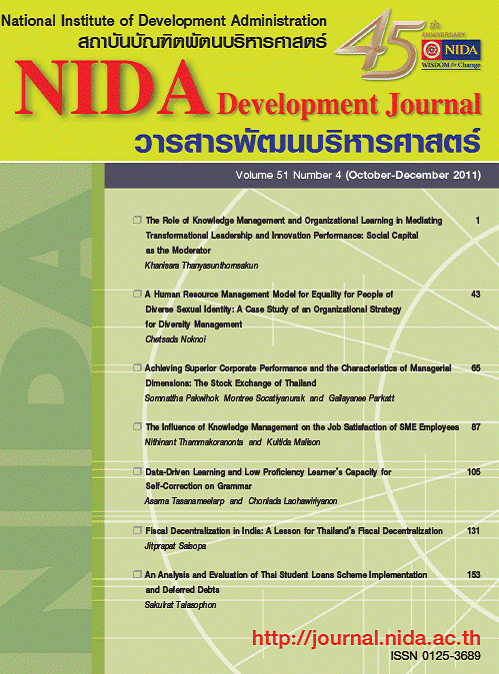An Analysis and Evaluation of Thai Student Loans Scheme Implementation and Deferred Debts การวิเคราะห์ การประเมินผลความสำเร็จในการดำเนินงานของกองทุนเงินให้กู้ยืมเพื่อการศึกษาและปัญหาหนี้ค้างชำระเกินกำหนด
Keywords:
Thai Student Loans Implementation, Deferred DebtsAbstract
This research is conducted mainly in order to analyze and evaluate the implementation of the Thai Student Loans Scheme (SLS). Since 1996, the government has launched a policy to increase educational opportunities for poor Thai students. However, the number of students from poor families studying at higher educational levels has not increased.
This research study finds that some Thai SLS policy implementation factors show policy failure, particularly regarding deferred debts. The five main theoretical factors for successful policy implementation are 1) clear policy objectives/ consistency with market demands and the national education plan; 2) budgets and resources; 3) characteristics of implementing agencies and the right organizational structure; 4) inter-organizational relationships; and 5) monitoring and evaluation. The author discovered that these factors impeded good performance of the Thai SLS. The author also discovered the main causes of the deferred debts, a serious management problem for the Thai SLS at the moment. So, The author have recommended many solutions to solve the deferred debts as well as to implement Thai SLS policy better. Finally, there are critical suggestions for policy implementers and policy makers, which is a call for Thai SLS policy reform.
การศึกษาวิจัยเรื่อง "การวิเคราะห์ การประเมินผลความสำเร็จในการดำเนินงานของกองทุนเงินให้กู้ยืมเพื่อการศึกษา และปัญหาหนี้ค้างชำระเกินกำหนด" มีวัตถุประสงค์ที่จะวิเคราะห์และประเมินผลการดำเนินงานของนโยบายกองทุนเงินให้กู้ยืมเพื่อการศึกษาที่ดำเนินการมา 10 ปี และในปัจจุบัน หากนโยบายดำเนินการสำเร็จจำนวนเด็กนักเรียน/ นักศึกษาที่มาจากครอบครัวยากจนและได้รับการศึกษาสูงจะต้องเพิ่มขึ้น เนื่องจากนโยบายนี้ต้องการเพิ่มโอกาสให้เด็กยากจนได้มีโอกาสเข้าถึงการศึกษามากขึ้น
ผลการวิจัยพบว่า นโยบายนี้ล้มเหลว และยังก่อเกิดปัญหาหนี้ค้างชำระเกินกำหนดในปัจจุบันอีกด้วย เนื่องจากปัจจัยห้าประการตามแนวคิดการนำนโยบายสาธารณะไปปฏิบัติ ได้แก่ วัตถุประสงค์ของนโยบายที่ไม่ชัดเจน ไม่แน่นอน และไม่เป็นไปตามทิศทางความต้องการแรงงานและแผนการศึกษาชาติ ถึงแม้งบประมาณและแหล่งเงินอุดหนุนพอเพียง แต่โครงสร้างและคุณลักษณะของหน่วยงานที่นำนโยบายไปปฏิบัติ ความสัมพันธ์ระหว่างหน่วยงานที่ปฏิบัตินโยบายไม่มีศักยภาพและความพร้อมที่จะปฏิบัตินโยบายอย่างมีประสิทธิภาพ การขาดการตรวจสอบและประเมินผลการดำเนินงานที่ไม่รัดกุม นอกจากนี้จากการศึกษายังค้นพบปัญหาหลักจากการบริหารจัดการได้แก่หนี้ค้างชำระเกินกำหนด ซึ่งผู้วิจัยได้เสนอแนะแนวทางแก้ไข ทั้งนี้ทางแก้ที่ดีที่สุด คือการปฏิรูปนโยบายกองทุนเงินให้กู้ยืมเพื่อการศึกษา





